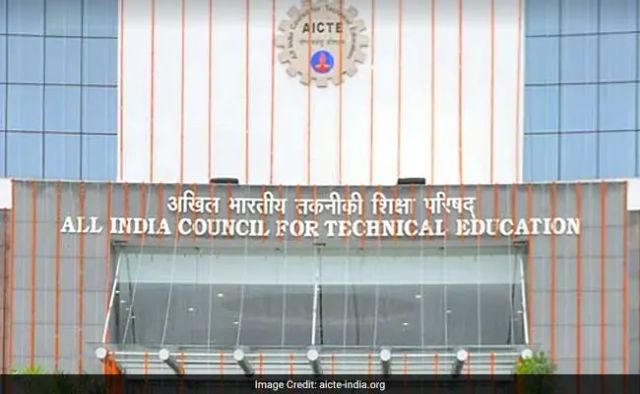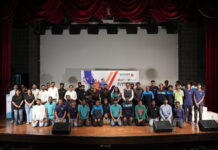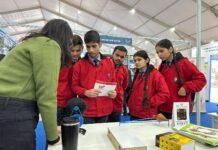New Delhi, March 29, 2022: The All India Council for Technical Education (AICTE) today announced that it has extended its moratorium for establishing new engineering institutes up to two years with certain exceptions.
The decision was announced today at a curtain raiser event of Approval Process 2022-23 where Chairman AICTE, Prof. Anil Sahasrabudhe officially released the Approval Process Handbook 2022-23. The program was also attended by Member Secretary, Prof. Rajive Kumar and Vice Chairman, Prof. M.P. Poonia, who addressed the stakeholders. An exhaustive presentation was made by Prof. Rajendra B. Kakde on the major changes and new additions of provisions/ norms in the Approval Process Handbook 2022-23.
Important Announcement – EasyShiksha has now started Online Internship Program “Ab India Sikhega Ghar Se”
The following are the exception under which moratorium for establishing new engineering institutes was extended up to two years:
- State Government proposal to start new Polytechnic in Conventional / Emerging / Multidisciplinary / Vocational areas including PPP mode shall be considered.
- Any Industry having a minimum annual turnover of ₹5000 Cr (in preceding 3 years) registered as Trust/Society/Company established under Section 8 of the Company Act, 2013.
- Philanthropical organizations existing for more than 25 years and running other educational institutes having minimum enrolment of 10,000 students having NIRF (if applicable) Ranking within 100 in the preceding year.
This Council has firmly institutionalised the implementation of various facets of NEP 2020 in its approved institutions. Chairman AICTE also announces that more than 40% of essential requirements already demanded by the Council from its approved institutions are NEP compliant.
“It is pertinent to mention that in the previous academic year the Council took a step forward to diminish the subject barrier by including total of 14 subjects studied in various school education boards across the country to make them eligible for pursuing technical education courses offered by the Council. The same gained quite a traction across the academia in the country. To clear the perception of Multiple Entry Multiple Exit (MEME) and bridge courses, the Council in its APH this year has included an eligibility table depicting course wise subject eligibility for admission to various branches of Engineering & Technology,” said Prof. Sahasrabudhe.
Another feather to its cap, the Council last year had announced technical education courses in Indian Languages. Consequently, in the last year alone the Council has granted approval to 19 Institutes/ Universities to conduct 26 technical courses in 6 Indian languages (Bengali, Hindi, Kannad, Marathi, Tamil & Telugu) in 10 states. Further, the Council also announces that in order to facilitate the smooth conduct of these courses, various translated books in Indian languages are being made available to the institutions. Council announces its target for implementation of printing of study materials in 12 Indian languages.
Standalone Institutions/ Institutions (Deemed to be Universities)/ Universities looking forward to introduce ODL/ Online program are required to get approval from respective regulatory body. AICTE permits ODL/Online programs only in Management (MBA, PGDM), Computer applications (MCA), Travel & Tourism, Logistics and AI and Data Science.
In line with NEP 2020, AICTE allows the Students for Multiple Entry & Multiple Exit in Professional / Vocational courses in the second/ third/ final year as applicable. Further, the policy envisages that all Higher Education Institutions (HEIs) should evolve into autonomous universities by the year 2040 with individual enrollment of above 3000. Consequently, this Council has facilitated Merger of Institutions without restriction of intake and has granted Autonomy to the PGDM Standalone Institutions under its purview.

AICTE under its present leadership was being quoted as shifting from the role of a regulator to that of a facilitator. However, the Council wishes to announce that off late it has evolved into an enabler. Following the mandate of this Council, various schemes of Institutional Development, Faculty Development and Student Development are being executed with positive results.
Needless to say that the Smart India Hackathons held on a yearly basis have become a National Technology Olympiad. Last two years of Pandemic, although quite harsh, showcased the prowess of its students to deliver an affordable low cost and local solution at a time when needed the most. An in-house example given by the Council was converting the whole Approval Process to Online mode including submission of documents, Scrutiny and subsequent Online meetings. This model has been appreciated by the Higher echelons in the Government and has been replicated in other departments. The online approval portal has been made more robust and user-friendly as of this year.
This Council as of this Academic Year has taken a giant leap in providing accessibility of technical education to aspirants from diverse fora.
This Council stresses on aptitude-based learning and permitted supernumerary seats for such Gifted and Talented Students who display extraordinary aptitude towards technical learning.
ALSO READ: IIITD partners with AI-based Research Assistant RAx
Apart from this, the Council has also permitted supernumerary seats under the PM Cares scheme for children who have lost both their parents during the pandemic.
Concluding, this Council has been mandated to maintain quality in technical education and also to preserve the interests of its education partners. By implementing these changes AICTE envisages a better environment of growth for technical education in the Country.
Alll Engineering course with Internship at one place visit EasyShiksha
































































